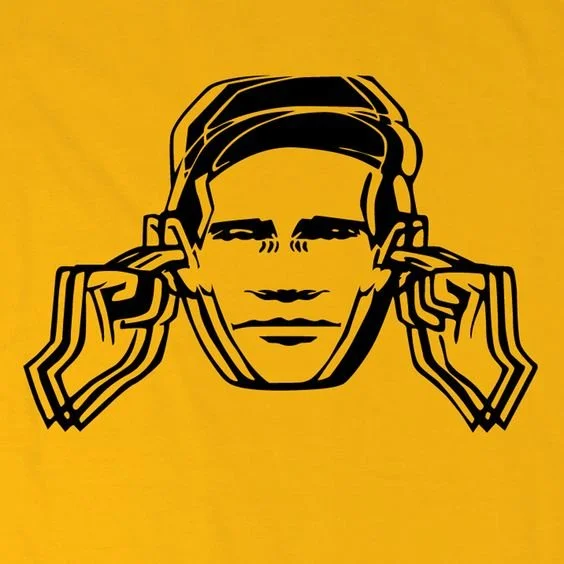Selling Out
1.
It really sucks that selling out is not really criticism that holds much ground these days. It’s barely visible, not even a critique cynical contrarians use to highlight an ever-bleakness that seems apparent in every artistic industry. I use artistic when describing the music industry only due to the content of what it produces, not suggesting that the modern-day music industry has any of the positive qualities one might associate with the word artistic. Seems to be not quite so possible in anything that is an industry—the two words which are oil and water that cannot mix, always in stages of negotiation and resistance against eachother. We live in the age of the entrepreneurial artist. The era of ‘getting your bag’.
Neoliberalism is the most unsatisfactory and accurate answer to the cause of this predicament. And there is no counterculture that pays even the smallest lip service to non-commercial values. Selling out has no opposition.
There are cultural reasons for why selling out is almost applauded these days, but the economic reality of being a modern-day artist is the most stark one. It is not as much of a survivable endeavor to be an artist without selling out as it was previously, even if it still is possible. Mark Fisher in Ghosts of My Life, writes about the way neoliberalism had this detrimental effect on British popular music in the 60s-80s. The innovativeness seen in the music during that period was because more working-class youth were able to gain an artistic education and live in cultural hubs via the welfare state. They were able to live a life with subsidized housing while not being starved artistically (and literally) with insane exploitative work-life imbalances. Once neoliberalism took its strangling hold and destroyed the welfare state, artists had to be more risk-averse, evaluating the economic considerations that threatened their art and their lives. Neoliberalism makes it so the barrier of entry only goes to the inept rich kids who bypass the working-class line. A line which, if not delicately balanced on for one without capital, would entail a drop into obscurity and poverty. There has been a growing discourse against nepotism in the music/film industry, but this is a critique that is backward in thinking as well. It is the critique of an individual and not the systemic conditions that led to this. The answer to the problem of nepotism in art is the societal deployment of the welfare state.
It is tough to blame the impoverished youth who made it in the modern-day culture industry for selling out; they had no choice but to adopt a pragmatic approach. Do not think that there is where the blame lies.
The cultural reasons for the sublimation of selling out is seen in what are the dominant musical genres of society. We see this battle of authenticity versus selling out in rap. Two currents negotiate against eachother: the glorification of the pursuit of money encourages people (fans) to root for the people making it, which is met by a rejection of artists who can be seen as straying from their routes. However, the latter is a critique loudly drowned out, and only relevant and created as an oppositional view. This view only exists due to the hyper-proliferation of the first. Country as a genre holds a different but similar example of these two currents, but country now is a walking corpse of what it was, rich men wearing tailored rags of what investors think poor/working-class communities look like. At least the 2014-2017 Soundcloud rap scene of drug-addled teens making huge hits in their bedrooms with low-quality equipment was, for a period of time, a real grassroots counter-cultural movement. There was an authenticity that has since been squelched out.
The concept of selling out is so completely alien now that the Influencer is a major desired cultural archetype. Their whole job is to sell out. To be a mouthpiece for brands, a vessel for advertising.
2.
The act of selling out by artists is made more salient and palatable due to the hypernature of fandoms online. Fandoms engage with their slop and celebrity in a form of vicarious consumption. More financial success, more brand deals/sponsors, is understood by fans as their own success in a vicariously loony way. Their lives are either miserable or just not entertaining enough, they project goals of finance and fame onto an artist/celebrity of choice, who they idolize in a very projected and narcissistic way. It’s why profile photos of social media accounts within fan communities usually are photos of the artist/creator in question, it’s more fun to be someone famous than it is to be yourself.
The previous point on fandoms online should be compared to the protectiveness over your hobby/media of choice that was seen in the pre-digital era. People had to be active and work hard to find interests outside of the mainstream. Friends, local communities, magazines, and 2-am television broadcasts where resources one would interact and engage with to develop their own taste and consumption. You become very protective over these hard-sought interests, and since most media pre-digital was not accessible to everyone, the people who discovered and were ‘fans’ took ownership of it. Both in a cultural and economic way. Hoarding and purchasing VHSs and DVDs, posters, or signed memorabilia. Physical purchase and consumption, which, to its extremes, is a process of neoliberal corrosiveness. Gatekeeping has its problems, but gatekeeping is essential in the maintenance of quality, and of a shared cultural understanding by those within a community. Byung Chul-Han writes this in Topology of Violence:
The total elimination of borders and thresholds is pornographic. The smooth, unbroken streams of hyperinformation and hypercommunication are also obscene, lacking the negativity of the secret, the inaccessible, or the hidden. The compulsion to render everything communicable and visible is also obscene. Communication without scenography is pornography. (50)
The difference between the pre-digital fandom and the digital fandom is that now the act of discovery is destroyed via algorithmically funnelled content. And also that the act of discovery occurs accidentally, and through much easier means than engaging with it in person.
It’s why there is such a defensiveness to critiques of artists who sell out, and even just of any artist with a sizable (most likely underage and mentally vulnerable) audience. When a Swift fan hears a critique of Taylor Swift this is taken and understood as a critique of your own self, your own projected narcissistic vicarious identity. Swift fans (and all fandoms to a severe extent) are like Rumi—Mima’s manager in Perfect Blue. Rumi, who suffers from a personality disorder where she switches between her real-life identity, and then believing she is the projected ideal pop idol of Mima, for whom she is supposed to be both fan and manager to. The very theme of that movie is the truly fucked-up relationships between idol and fandoms, with the desperation of pursuing fame surrounded by suits who care more about squeezing you dry for profit until you are a husk of your former self being the undercurrent of Mima’s journey. Fandomization and hyper-obsession with idols and artists is perverse, a completely undignified activity that is ever so common these days. Especially when the people in question aren’t even deserving of it! (not that anyone should be).
3.
The Swift example also highlights the still continued domination of Neoliberal post-feminism. This societal encouragement that tells women that they can empower themselves through purchase and consumption. It is the outcome of the idea of the Neoliberal self, where social and public issues are understood through a process of personalization and individualization in a process of self-surveillance and discipline. The truly corporate nature of Taylor Swift’s financial acumen is seen in the number of album drops, decadent vinyl releases, ticket prices, and consistent productions of content that is tailored for the contemporary streaming market. Every ‘artistic’ decision is also the best financial decision. This kind of approach to making ‘art’ reduces it primarily into an economic object, one to purchase and consume, to remain up to date with the fandom.
Neoliberal post-feminism, much like Sarah Banet-Weiser’s concept of Popular Feminism. Where there is an acknowledgement of societal inequalities, but only emphasizes feminism through emphasizing the empowerment of individual women. Those of which tend to always be white, middle-class and heterosexual. They are the most vocal and visible. When the Internet and modern capitalism mean we exist in an attention economy, visibility through media representation becomes an end goal rather than a means for chance. We only see the most entrepreneurial form of feminism exist. We see only the most entrepreneurial form of art exist as a consequence.
The most successful artists in music now are those who give their slop a social movement flavour, which is like MSG for consumption. And it is striking that this social movement flavour is never one which revolves around class, that is one critique that never makes it mainstream in the culture industry.
4.
We have gone full simulacra. Popular artists now aren’t even artists, the majority of them don’t even play an instrument, let alone write their own music. They are just ornaments and decorations on the product of consumption. This breeds a society of youth who dream of being influencers, celebrities, and YouTubers. Their dream is fame, the end result which skips the work that goes to achieve it. Selling out is the way they achieve fame by wanting to procure a job where they don’t have to do anything at all, just a vessel for advertisers to prop them up for fame. And as all experiences and expressions of life move online, even small acts of posting your own art/work on social media are selling out. Creating content that would get views, or happily tilling your garden of weeds and rotting works for an audience of none. They thought streaming would open up the gates to allow anyone to create art, but there was no understanding that it changed the creative practice of art itself. Where self-advertising and selling out is essential in the digital era of a total elimination of borders.
This goes for all media now in the digital form. It really is disgusting to be waterboarded with an ad during a YouTube video, one that isn’t even given by the platform itself but instead takes up 1-3 minutes of a YouTuber’s video. A serious topic suddenly halts for the creator to transform into a puppet, telling me how I can make my own website with Wix.
I find any creation of art that has an intended audience of mind to be dangerous in the exploitative sense. As it is not an intended audience but an intended consumer. It does not matter whether it is meant to resonate with traumatized individuals or speak to marginalized communities. But because it is under the blanket of popular culture, and being owned and weaponized by the profit models of record labels and corporations, the end result is always an economic one. They exploit the sentimental to achieve the economic. Any art made with the intention of an audience in mind will fail in trying to achieve the transcendent quality which art can have.
But what did I expect! The cultural industry will continue to subordinate and homogenize as time marches on. It’s proliferation and power never halting, always advancing. And it’ll march on ever radicalizing long after I’m deep underground.

